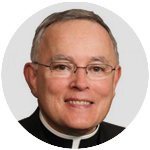
Archbishop Charles Chaput, O.F.M. Cap.
Every January starts a new year and has a number of important dates. The week of January 18-25, for example, is the annual Week of Prayer for Christian Unity. But for many millions of Americans, the central day of the month is the memorial of Dr. Martin Luther King, Jr., the great voice for racial justice. Murdered in 1968, Dr. King elevated the conscience of a nation by both his life and his death. He returned hatred with love, ignorance with patience, threats with courage.
This year we honor Dr. King’s memory on January 21, and remembering him could hardly be more urgent. We live in an age of venomous identity politics and self-satisfied bullying, a time (to borrow from the poet Yeats) when “the best lack all conviction, while the worst are filled with passionate intensity.” Part of this can be blamed on an eccentric and often vulgar White House, but the problem is much deeper and wider than one man. And it now infects both of our political parties.
We’ve lost a common language of public discourse. For King, who was himself a minister of the Gospel, that common language was the Christian moral sense implicit in the American experiment from its beginning and shared, at least in the 1960s, by nearly all Americans, believers and non-believers alike.
[hotblock]
For King, human beings might disagree, even profoundly, but they never lost their right to be spoken of and treated with respect as children of God. The important thing is this: King was never a generic humanitarian. If he were, he could never have accomplished the things he did. He was first and finally a minister of Jesus Christ. His faith grounded his actions, the same faith that inspired and helped to shape the best of the American character. That’s why our nation finally listened to him.
A lot has changed in 50 years, some of it good, some of it not, and some of it involves a crippling loss of decency and common sense in some members of Congress around matters of religious faith. It’s ugly, it’s vindictive, and it damages all of us.
Rev. Eugene Rivers, based in Boston, is an articulate leader and an impressive African-American Pentecostal minister. Like others in his generation who have tried to take the witness of Dr. King seriously, he focuses on finding the best in people and building on what unites rather than divides them. That makes his work fruitful and his words worth listening to. It also makes his criticism damning. Writing in the Wall Street Journal on January 3 (“Another Religious Test in the Senate’), he noted:
“People often assumed that prejudice against Catholic politicians ended with the election of John F. Kennedy. Yet anti-Catholic bigotry is still with us. On Dec. 5, U.S. senators sent written questions to Brian Buescher, an Omaha, Neb., lawyer recently nominated by President Trump to sit on the U.S. District Court in Nebraska. Amid queries about judicial philosophy, two Democratic senators demanded answers about Mr. Buescher’s membership in the Knights of Columbus, a 140-year-old Catholic service organization.
[tower]
“Hawaii’s Mazie Hirono and California’s Kamala Harris didn’t ask about the group’s charitable work, which includes $1 billion of assistance and hundreds of millions of hours of service in the past decade. Rather, they wanted answers about what they called its ‘extreme positions.’
“The senators cited the group’s support in 2008 for California Proposition 8, which banned same-sex marriage. They also took issue with the group’s opposition to abortion.”
“Each senator insinuated that Mr. Buescher’s membership should disqualify him.”
The sheer ignorance, not to mention injustice, in the senators’ describing the Knights as “extreme” would be baffling – if it weren’t part of pattern of bigoted thinking already sanctified by other senators like Dianne Feinstein (D-CA) in her vulgar 2017 grilling of now-Judge Amy Coney Barrett (“The dogma lives loudly within you, and that’s a concern”).
In the words of Rev. Rivers:
“As a leader of black Christians, I feel particularly strongly about the Knights of Columbus. For more than a century they bravely defended minorities … If Catholics like the Knights can be targeted, what should members of my Pentecostal church expect? We share traditional views on abortion and marriage. What about Orthodox Jews, Muslims, Mormons and evangelical Christians? Even the Rev. Martin Luther King’s biblical beliefs would be anathema to Sens. Harris, Feinstein and Hirono. JFK, himself a proud Knight of Columbus, would be unacceptable too.”
Again: Every January starts a new year and has a number of important dates. This January, one of the most important dates is national Religious Freedom Day, January 16. It’s worth reminding our elected and appointed officials that a vigorous definition of religious liberty is still part of the Constitution.
And while we’re doing that, we might thank God for the generosity, dedication, and faithfully Catholic work of the Knights of Columbus.



He’s also done more than any other president in modern history to make acceptable the most churlish and degrading action again anyone, male or female, whom he can portray as weaer than his brutish self. Christianity is not a one issue moral position. His pro-life position can be best described as pro-fetus. The rest of life does not appear to matter very much. He would not survive in any boardroom of a publicly held company, and his outrageous behavior should be called out by our bishops.
President Donald Trump has already done more to protect preborn children during his approximate 24 months in office than President Reagan did in eight years. He has also done more to help elevate the poor and oppressed to enter the job market than any President in my lifetime. President Trump has espoused Pro-life virtues. If that’s a “vulgar” White House, give me more of it.